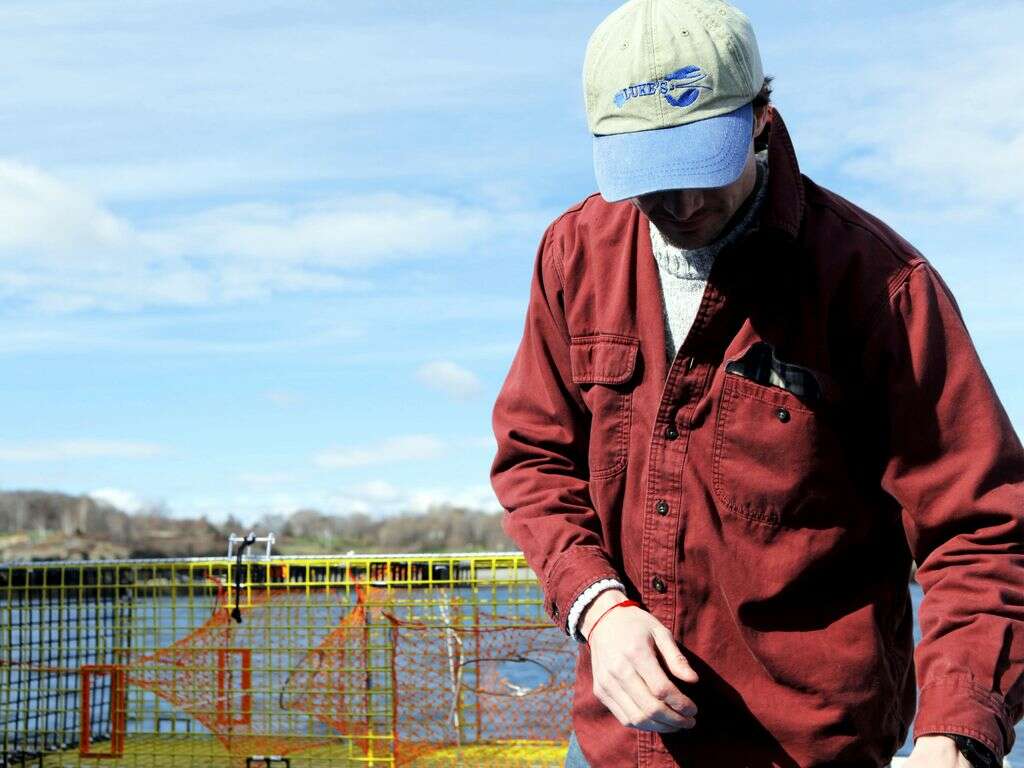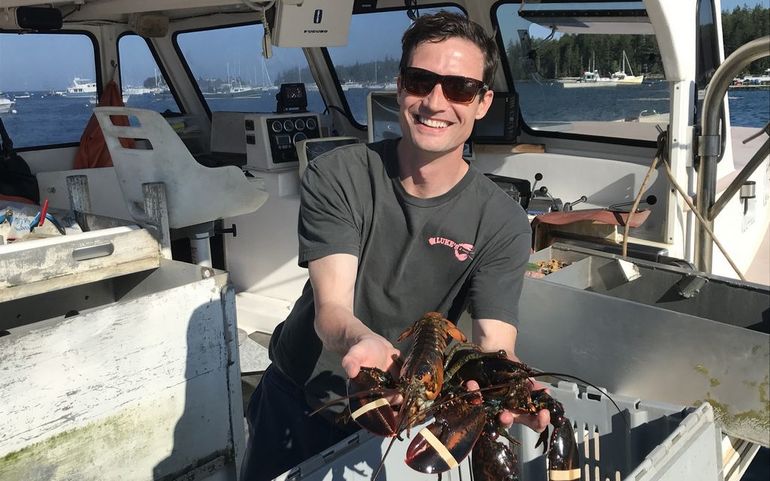
As Luke's Lobster grows, its owner keeps an eye on sustainability
 Courtesy / Luke's Lobster
Luke's Lobster founder Luke Holden says he has initiatives underway that are aimed at furthering the sustainability of the lobster industry in sync with the company's growth.
Courtesy / Luke's Lobster
Luke's Lobster founder Luke Holden says he has initiatives underway that are aimed at furthering the sustainability of the lobster industry in sync with the company's growth.
Luke’s Lobster, which became a certified B Corporation earlier this year, has initiatives underway that company founder Luke Holden said are aimed at furthering the sustainability of the lobster industry in sync with the company’s growth.
The initiatives include a profit-sharing program with two Maine lobster co-ops whose product is sold through Whole Foods Market and the rebuild of a decaying fishing pier and buying station in Portland.
These programs benefit the industry and the company together, Holden told Mainebiz.
“It all starts with the fishermen,” he said. “Without them, we don’t have the great product to sell in our restaurants or through our retail partners. We’re a certified B Corporation, so it’s in our DNA to look for the win-win as we grow the business.”
The co-op partnership model began in 2016, shortly after Tenants Harbor fishermen and Holden founded the Tenants Harbor Fisherman’s Co-op on Miller’s Wharf, according to a company news release. At that time, Holden started a restaurant on Miller’s Wharf and began returning 50% of the profits from the restaurant back to the co-op.
Holden told Mainebiz he began pursuing a relationship with Whole Foods around the same time. Today, he sells to the chain about 10% of his lobster tail and lobster meat products, processed at his company's seafood facility in Saco.
But in order to sell to Whole Foods, participating fishermen had to undergo a stringent audit to ensure the sustainability of their lobster-handling practices, he said. Criteria included ensuring lobsters are on a truck within 24 hours of being caught, and a procedure that calls for fishermen to handle one lobster per hand at a time, rather than multiple lobsters. The procedure is designed to avoid stressing the animal. Whole Foods Market representatives accompanied fishermen out to haul and completed audits at the co-op’s buying station.
In 2017, the fishermen of the Cranberry Isles Fishermen’s Co-op also became Whole Foods Market certified through Luke’s.
The official launch nationally of Luke’s Lobster retail lobster products in Whole Foods Market occurred in November, according to the release.
As a result of the relationship with Whole Foods, the company is now returning 1% of those sale proceeds to the two co-ops, said Holden. That works out to about 10% of the company’s margin on those products, he added.
About 25% of the product that goes to Whole Foods comes from the two co-ops, Holden said. The rest comes from Luke’s Lobster’s buying station in Portland and from other dealers along the Maine coast.
Holden said he plans to look at expanding his base of participating fishermen in the profit-sharing program.
“As we take on additional customers, we hope to build diversified streams of income for these fishermen,” Holden said. “The industry works on just paying a price per pound, and we’re trying to get into paying for quality and creating win-wins.”
Two-way dialogue
Josh Miller, president of the Tenants Harbor co-op, said the co-op sells all of its product to Luke’s Lobster. That’s about 600,000 to 800,000 pounds per year; the figure varies annually.
Miller said the relationship with Luke’s Lobster has been a financial benefit for fishermen.
“But it was really about was developing a relationship with our lobster buyer — an open relationship where you can have two-way dialogues instead of someone telling you what you can sell your lobster for,” Miller continued. “We have conversations about different ways we can work together to return higher value and make more money together.”
The Whole Foods relationship came about because of that open communication, he added.
“Luke’s Lobster developed a relationship with Whole Foods, and Whole Foods said, ‘We would be willing to buy lobster from you but we have certain chain-of-custody requirements,’” he explained. “Luke’s came back to us and said, ‘We want to develop this relationship with Whole Foods. Would you be willing to look at this list of requirements and see if this is something you can work with – and then there would be more money in it for both of us.’ So that’s a conversation we had together.”
The co-op was onboard.
“We handle our lobster as best we can anyway,” Miller continued. “That’s been a point of emphasis since we formed our co-op. So it wasn’t that big of a stretch.”
The partnership has made a considerable difference in the co-op’s bottom line, co-op treasurer and fisherman John Tripp said in the release: “When we looked at our numbers at the end of the year, the Whole Foods Market partnership through Luke’s made a difference in what we were able to return to our fishermen-members in terms of a dividend.”
Portland pier renovation and restaurant

Luke's Lobster began in 2009 with a single seafood shop in New York City. Today it runs 40 seafood retailing shacks and food trucks across the U.S. and in Japan and Taiwan, in 2017 growing over $30 million in sales.
Its Tenants Harbor location has been the only one in Maine, but Holden is planning to open a second Maine location at the Portland Pier next summer.
Holden said his company has been growing each year. For 2018, he’s bought and processed about 5 million pounds, a 20% to 30% increase from 2017.
Luke’s donates a portion of its proceeds to The Ocean Foundation and the Island Institute.
In June, Luke’s Lobster collaborated with Portland Pier Holdings, which owns the Portland Pier on the Portland waterfront, to rebuild the pier and restore its buying station to commercial grade standards. Renovations are now underway for a lobster and seafood restaurant at 60 Portland Pier, in a space that was previously a residential condominium, according to the release. The restaurant — to seat approximately 200 guests and feature lobster bought at the wharf and other locally sourced seafood including scallops, clams, mussels, and fish — is expected to open next summer.
The $1 million pier renovation included rebuilding the pilings and replacing crumbling 4-foot-wide floats with new 10-foot floats, providing fishermen with more space to load, unload and work on their gear. The wharf’s joists and decking were rebuilt. The buying station’s broken hoist and pump and leaking holding tanks were replaced. The rebuilt wharf has nine berths for commercial fishing boats; the plan is to increase that number. The project also preserved dedicated priority parking spaces for commercial fishermen.
“I’ve been a lobsterman in Portland and Long Island for over 30 years,” Steve Train, who operates the fishing vessel Wild Irish Rose, said in the release. “The improvements to the wharf have made accessing my boat with gear and supplies both safer and easier. With Luke’s I have a great partner to sell my lobsters to. Luke’s understands what fishermen need at the wharf. This project will help maintain Portland’s fishing industry.”
The work was much needed, Holden said.
“Last winter, before we signed the lease, a truck fell through the wharf and a plow truck ripped up the decking,” he said. “There was no power for the boats, no water for the boats and the floats were 20, 30, 40 years old.”
Holden, who credits his team for new ideas to move the company forward, said he began buying tuna at Portland Pier this year, and will be looking at buying scallops and halibut.
The buying station buys from 15-plus lobster boats and seeks to expand the number of lobster boats in the coming months.
Overall, despite challenges facing the lobster industry, Holden said he’s optimistic about the future. Those challenges include changing ocean conditions; advantages held by Canada in trading with the European Union; and what’s viewed as an upcoming bait crisis with an expected cutback in the herring fishery in 2019.
“This industry is driven by problem-solvers,” he said. “We’re all entrepreneurs. We all have a resilient nature and we figure out how to persevere.”









Comments